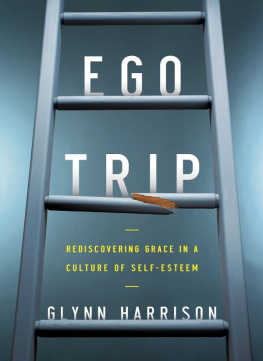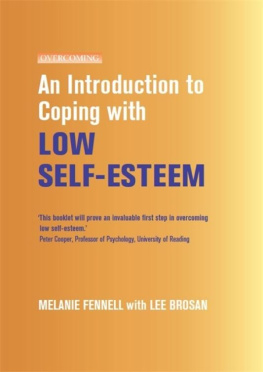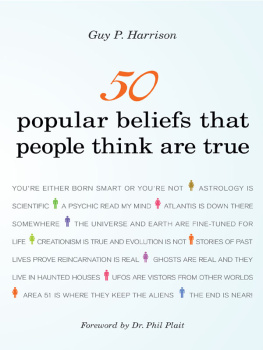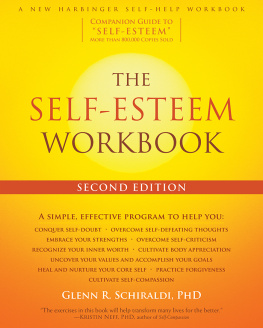
Professor Glynn Harrison is a psychiatrist with an engaging sense of self-deprecating humor and the ability to explain complex psychological theories with a felicitous lucidity. In Ego Trip he stands in the tradition of Hans Christian Andersen in showing that the new psychologys emperor, aptly named Boosterism, in reality has no clothes on. At the same time, Dr Harrison displays compassion for, and offers hope to, those with deep psychological wounds (self-inflicted or otherwise). Ego Trip is a must-read not only for those with a special interest in psychology and psychiatry, but for all parents, teenagers, and studentsindeed for anyone seeking a trustworthy guide through the labyrinthine quest for self-esteem.
Sinclair B. Ferguson, Professor of Systematic Theology, Redeemer Theological Seminary, Dallas
Glynn Harrison uses his vast experience in psychiatric practice and research to examine the cultural and psychological roots of the incredibly influential self-esteem movement. He summarizes, digests, and evaluates huge amounts of research, and explains what he is doing with humor and many helpful examples, thus making complex ideas accessible to anyone. His conclusions are startling and have big consequences for education, psychology, and counseling. In the last third of the book he builds an alternative foundation, from a Christian and biblical worldview, for how we should view ourselves, and thus demonstrates the profound practical implications of this new perspective for our lives and relationships. This is a superb example of a sharp Christian mind at work, helping us to evaluate the ways in which we have been seduced and brainwashed by our culture.
Richard Winter, psychotherapist and Professor of Practical Theology and Counseling, Covenant Theological Seminary, St. Louis
Ego Trip is readily accessible and is written for a thinking Christian readership; it will be uniquely helpful to those working as psychotherapist, counselor, health or social work professionals dealing with people, or to any helpful human being in every church. As a psychiatrist, the dilemma of self-esteem has troubled me for more than forty years: I know from my everyday practice that people are crippled by low self-esteem, but what I have learnt as a Christian directs me to deny myself and put others firstto be crucified with Christ. How does one reconcile these apparently conflicting ideas?
In resolving this question, Glynn Harrisons unerring instinct for creative controversy has led him to a topic where he now makes a hugely insightful contribution. This book truly shows us the big picture, and I will strongly recommend it.
We are led on an intriguing stroll through the attractive but sinister byways of narcissism, the concept that we are worthy of happiness, boosterism (feeling good about myself), and children treated as little princesses. All of this is contrasted with the very positive remedy of amazing grace. We are recommended to stop judging ourselves, to be compassionate toward ourselves, but not to fall into the trap of a vacuous pursuit of self-esteem. This is a book to stimulate, and not stifle, debate amongst Christians on a topic that is of extreme relevance, but rarely mentioned in contemporary society.
Andrew Sims, Emeritus Professor of Psychiatry, University of Leeds; past President, Royal College of Psychiatrists
The apostle Paul challenged early followers of Jesus, Do not be conformed to this world, but be transformed by the renewal of your mind. This exhortation is still timely and essential. We will either be shaped by the culture surrounding us or we will be shaped by Gods Word. Glynn Harrison does an excellent job of identifying, analyzing, and critiquing the history and enormous influence of the self-esteem movement. He then develops a Christian approach to self that is biblical, intelligent, and sensible. This book is fascinating, insightful, and wise, and a wonderful resource to any Christian who wants to be transformed by the renewal of your mind.
Dr. Greg Pritchard, Director of European Leadership Forum and President of Communication Institute, Lisle, Illinois
This is an important and timely book. It is so helpful to have attitudes to self-esteem traced historically and culturally and then critiqued from the viewpoint of the Christian gospel. For me, one of the most valuable benefits has been to see how a human-centered cultural trend has crept unnoticed into the church. This has been a salutary warning to me personally. The book deserves to be widely read, both by thinking Christians and also by those outside the Christian church who want a fresh insight into the countercultural surprise of the gospel of grace. I commend it warmly....
Christopher Ash, Director of the Proclamation Trusts Cornhill Training Course
ZONDERVAN
Ego Trip
Copyright 2013 by Glynn Harrison
Originally published in the UK as The Big Ego Trip
by Inter-Varsity Press, Norton Street, Nottingham NG7 3HR England
Email: ivp@ivpbooks.com; Website: www.ivpbooks.com
ePub Edition December 2013: ISBN 978-0-310-51655-2
Requests for information should be addressed to:
Zondervan, Grand Rapids, Michigan 49530
Library of Congress Cataloging-in-Publication Data
Harrison, Glynn.
Ego trip : rediscovering grace in a culture of self-esteem / Glynn Harrison.
pages cm
Includes bibliographical references.
ISBN 978-0-310-51654-5 (softcover) ISBN 978-0-310-51655-2 (ebook)
1. Grace (Theology) 2. Self-esteemReligious aspectsChristianity. 3. Self-esteem. 4. Ego (Psychology) I. Title.
BT761.3.H55 2014
234dc23
2013034279
Scripture quotations marked NIV are taken from The Holy Bible, New International Version, NIV. Copyright 1973, 1978, 1984, 2011 by Biblica, Inc. Used by permission. All rights reserved worldwide.
Any Internet addresses (websites, blogs, etc.) and telephone numbers in this book are offered as a resource. They are not intended in any way to be or imply an endorsement by Zondervan, nor does Zondervan vouch for the content of these sites and numbers for the life of this book.
All rights reserved. No part of this publication may be reproduced, stored in a retrieval system, or transmitted in any form or by any means electronic, mechanical, photocopy, recording, or any other except for brief quotations in printed reviews, without the prior permission of the publisher.
Cover design: Faceout Studio, Tim Green
Interior design: Ben Fetterley and Greg Johnson/Textbook Perfect
Printed in the United States of America
13 14 15 16 17 18 /DCI/ 22 21 20 19 18 17 16 15 14 13 12 11 10 9 8 7 6 5 4 3 2 1
For Amy,
who labors on an island far away,
a guest of a greater reality...
CONTENTS
W hy are there so many unsatisfactory books out there on self-esteem, I wondered? Now I know.
Self-esteem is a slippery concept that means so many different things to so many different people that its impossible even to begin to meet expectations. It impacts upon a huge range of disciplines psychology, psychiatry, biology, sociology, education, social policy, philosophy, theology each with a contentious literature that stretches back decades, if not centuries, and leaves more questions than answers. So where do we begin? And when do we stop? Inevitably, this slim volume simply reflects where Ive gotten to so far. I can only hope that, at the very least, it gets you thinking creatively about this topic.
Im hugely grateful to so many individuals who have challenged and informed my thinking over the years. Monty Barker, a fellow psychiatrist, has been an inspiration and a model for nearly forty years. Im grateful to other Christian-psychiatrist colleagues such as Richard Winter and Jan Truscott and, more recently, to Jon Haynes and Ben Watson. In writing this book I owe a debt of gratitude to Ed Shaw for his advice and feedback on earlier drafts, and similarly to Christopher Ash for his encouragement and wisdom, and for his attempts to keep me on the theological straight and narrow. I doubt that he succeeded, however, and the many shortcomings are thus entirely mine. Im grateful too to my editor Eleanor Trotter who has sustained my enthusiasm and offered crucial comments at just the right moments.
Next page










